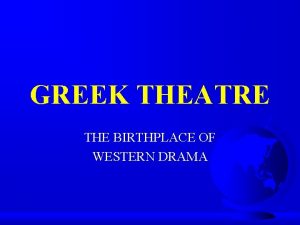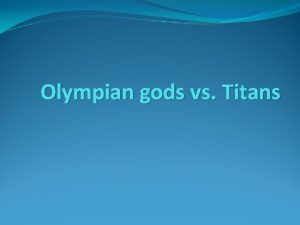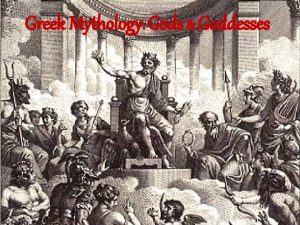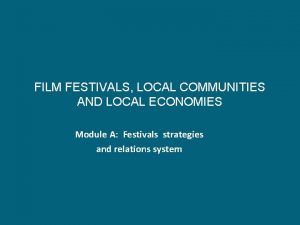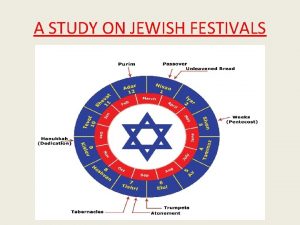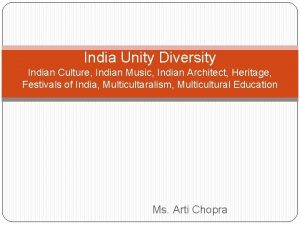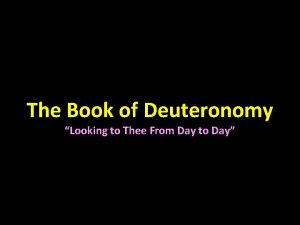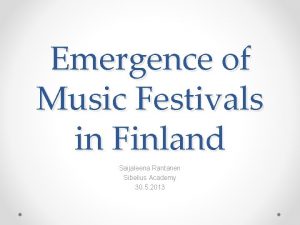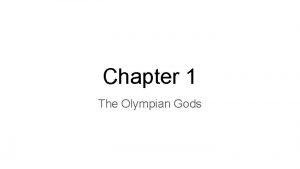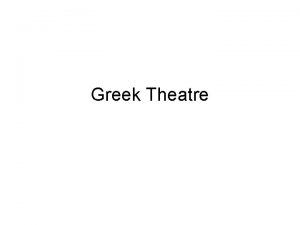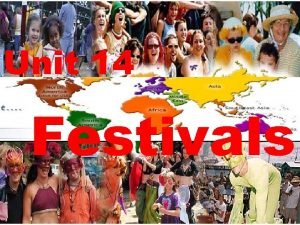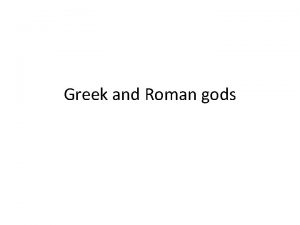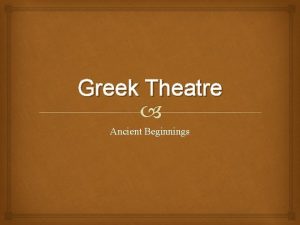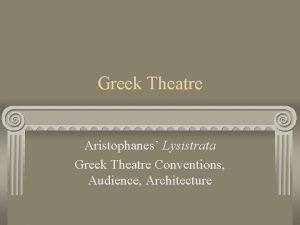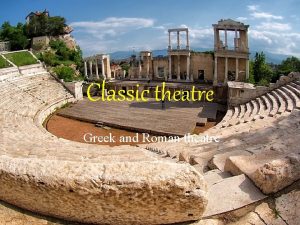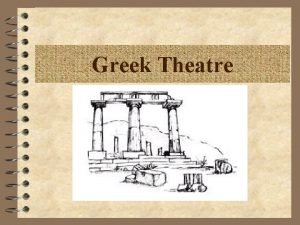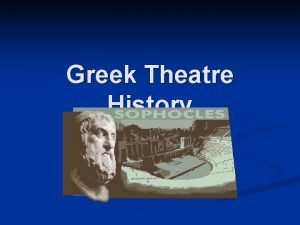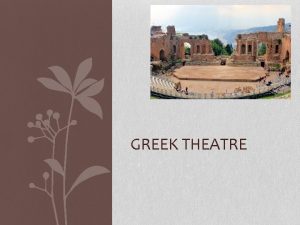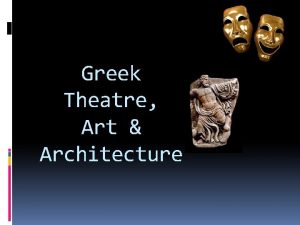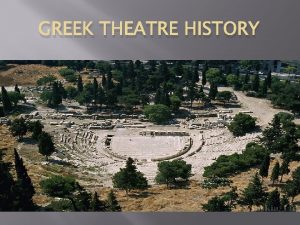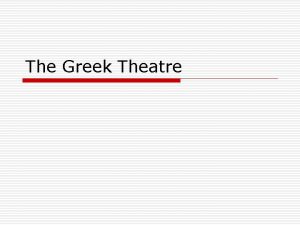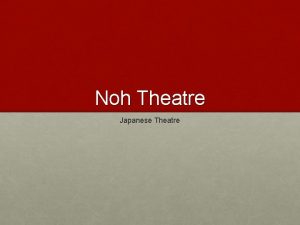Greek Theatre Greek Festivals F Festivals honored Olympian






















- Slides: 22

Greek Theatre

Greek Festivals F Festivals honored Olympian gods F Competitions F Drama: Dionysos ® Tragedy ® Comedy

Theatre Festivals ® There were two festivals during which dramatic productions were staged. ®The Greater Dionysia took place at the end of March or the beginning of April ®Three days were given over to theatrical competition. ®Three playwrights each took part in the contests: ®Tragedies – trilogy format Morning Presentation ®Comedy – one comedy in the Afternoon



Theatre at Epidaurus

ACTORS ® No tragedy used more than 3 actors ® All actors were male ® Costumes included character masks, and, in later years, raised boots ® Acting must have more expressive than realistic

Greek Theatre Masks

Greek Tragedy ®Nearly all surviving tragedies are based on myth ®Character’s struggle against hostile forces ended in defeat and ultimately in death ®Often follow historical events so the audience KNOWS what will happen ®Episodes performed by a few actors never more than 3 on stage

Greek Tragedy ®Heroes were mortals, ®such as Helen of Troy or Achilles, . ® Murder and incest violate natural law as ®well as human law, so these crimes were seen as offensive to the gods.

Greek Tragedy ®When a murder was committed, the murderer, the place of the crime, and any place that harbored the killer were polluted, (AKA gods were upset) ® • A proper ritual cleansing (catharsis) was ®necessary to restore both person and place to an acceptable state.

The Tragic Hero ®Must be a character of noble stature and greatness. (Oedipus is King of Thebes) ®The character must occupy a "high“ status position but must ALSO embody nobility and virtue as part of his/her innate character. (Cares about the people)

The Tragic Hero ®Though the tragic hero is pre-eminently great, he/she is not perfect. Otherwise, the rest of us-- mere mortals--would be unable to identify with the tragic hero. ®Can you think of any tragic hero’s in modern society? (Hint: politicians, athletes, clergy, etc. Name a few if you can)

The Tragic Hero ®The hero's downfall, therefore, is partially her/his own fault, the result of free choice, The tragedy is usually triggered by some error of judgment or some character flaw This error of judgment or character flaw is known as hamartia and is usually translated as "tragic flaw". ®Hamartia involves hubris (which is arrogant pride or overconfidence).

Tragic Hero’s Ending ®The hero's misfortune is not wholly deserved. ®The punishment exceeds the crime. ®There is some increase in awareness, ®some gain in self knowledge. The tragic hero has an Ah-Ha Moment

Purge Thy. Self ® • Aristotle argues that one function of tragedy is to arouse the "unhealthy“ emotions of pity and fear and through a catharsis (which comes from watching the tragic hero's terrible fate) cleanse us of those emotions.

What does it all Mean? ® • Demanding that the world “answer to me” instead of the other way around leads to a systematic destruction. ® • Living life only on your own terms is going to come to a self-destructive end.

A Message from Oedipus “Life is mysterious and cruel. You may think you can live your life however you want, but fate is much more powerful, complex, and hostile. Fate punishes arbitrarily and mercilessly those who choose to confront the mystery of it. ”

THE CHORUS: the voice of the citizens

TRAGIC STRUCTURE PROLOGOS: Introductory scene PARADOS: Entry of chorus EPISODEION STASIMON 4 -5 alternating scenes and choral odes, including the EXODOS: final scene EPODE: final ode.

SOPHOCLES 496 - 406 ® Wrote over 123 plays, but only seven survive ® Credited with adding the third actor ® Known as actor as well as dramatist ® Most interested in human dynamics ®THEBAN PLAYS: ®Oedipus the King ® Oedipus at Colonnus ® Antigone

The End
 Greek theatre festivals
Greek theatre festivals Greek theatre festivals
Greek theatre festivals We are honored to have you as our guest
We are honored to have you as our guest Otus and ephialtes percy jackson
Otus and ephialtes percy jackson 12 griekse goden olympus
12 griekse goden olympus Greek mythology chart
Greek mythology chart Sparta gods and goddesses
Sparta gods and goddesses Chaos family tree
Chaos family tree Olympian high school counselors
Olympian high school counselors Swot analysis of festivals
Swot analysis of festivals Name of style
Name of style Polish national dress boy
Polish national dress boy Unit 13 festivals read
Unit 13 festivals read Ninkly panadda
Ninkly panadda Jewish festivals in order
Jewish festivals in order Festivals in english speaking countries
Festivals in english speaking countries Unity in diversity in indian culture
Unity in diversity in indian culture Agusan del sur festivals
Agusan del sur festivals Deuteronomy 5:19
Deuteronomy 5:19 Saijaleena rantanen
Saijaleena rantanen Italy holidays and celebrations
Italy holidays and celebrations Festivals
Festivals Greek drama origin
Greek drama origin
